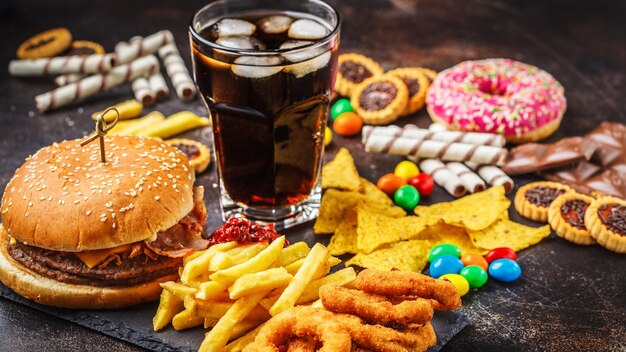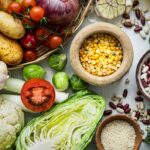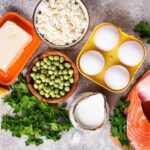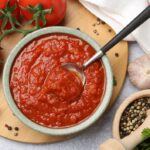Building and maintaining healthy muscles requires proper nutrition, which involves consuming foods rich in protein, vitamins, and minerals. However, there are certain foods that can hinder muscle growth, recovery, and overall health. To optimize muscle function, avoid these 20 foods that could sabotage your fitness goals.
1. Sugary Drinks
Soft drinks and energy drinks contain excessive sugar, which leads to spikes in insulin levels. These sugar surges can promote fat storage rather than muscle growth and impair recovery post-exercise.
2. Processed Meats
Bacon, sausages, and deli meats are high in unhealthy fats and sodium. Consuming them frequently can lead to inflammation and reduced muscle recovery, hindering your muscle-building efforts.
3. Fried Foods
French fries, fried chicken, and other deep-fried foods are loaded with trans fats, which can increase inflammation in the body. Inflammation interferes with muscle recovery and repair, slowing down progress.
4. Pastries and Doughnuts
High in sugar, unhealthy fats, and empty calories, pastries like doughnuts do little to support muscle growth. They provide quick energy but lead to crashes, leaving you feeling sluggish and decreasing workout performance.
5. Alcohol
Alcohol interferes with protein synthesis, which is crucial for muscle repair and growth. It also dehydrates the body, making it harder to recover from workouts and reducing muscle function.
6. Instant Noodles
Instant noodles are low in nutrients and high in sodium and unhealthy fats. They provide little in terms of muscle-building benefits and can lead to water retention, making you feel bloated and sluggish.
7. Candy
Sugary treats like candy contribute to fat gain and energy crashes rather than supporting muscle recovery and growth. They lack protein and essential nutrients needed for maintaining muscle health.
8. White Bread
Refined carbohydrates like white bread offer little nutritional value. They provide a quick burst of energy but are lacking in fiber and essential nutrients that promote sustained energy and muscle recovery.
9. Salty Snacks
Potato chips, pretzels, and other salty snacks can dehydrate your body due to their high sodium content. Dehydration leads to muscle cramps and reduced strength during workouts.
10. Ice Cream
While tasty, ice cream is high in saturated fat and sugar, which can promote fat storage instead of muscle growth. It’s a poor choice for post-workout recovery due to its lack of beneficial nutrients.
11. Fast Food
Fast food items like burgers, fries, and pizzas are high in unhealthy fats, sodium, and calories. They offer little to no support for muscle growth and can lead to increased fat storage and inflammation.
12. Processed Cheese
Processed cheese products like cheese spreads and slices are full of unhealthy fats and preservatives. These cheeses offer fewer nutrients than natural cheeses and can slow down muscle recovery.
13. Cakes and Muffins
Cakes, muffins, and other baked goods made with refined flour and sugar lack protein and essential nutrients. These foods lead to energy spikes followed by crashes, negatively impacting muscle performance.
14. Canned Soup
Many canned soups are high in sodium and preservatives, which can dehydrate your body and lead to muscle cramps. Opt for homemade soups with fresh ingredients to support muscle health.
15. Soda
Soda is loaded with sugar and empty calories that contribute to weight gain rather than muscle gain. The excess sugar can also cause insulin spikes, which reduces the body’s ability to burn fat and build muscle.
16. Artificial Sweeteners
Although artificial sweeteners like aspartame are marketed as low-calorie alternatives, they can disrupt digestion and gut health. Poor digestion can interfere with nutrient absorption, which is vital for muscle growth.
17. Granola Bars (High-Sugar Varieties)
While some granola bars are marketed as healthy, many contain added sugars and unhealthy fats. These varieties provide little protein or nutrients needed for muscle recovery, making them a poor snack choice.
18. Cream-Based Sauces
Alfredo sauce, creamy salad dressings, and other cream-based sauces are high in saturated fats. These fats slow digestion and can contribute to fat gain, hindering muscle-building efforts.
19. White Rice
While white rice is a popular carbohydrate source, it lacks the fiber and nutrients found in whole grains like brown rice. It leads to quick spikes in blood sugar and insulin, which can promote fat storage instead of muscle development.
20. Breakfast Cereals (Sugary Varieties)
Many breakfast cereals, especially those aimed at children, are high in sugar and low in protein. They can lead to an energy crash and provide little nutritional value to support muscle growth or recovery.
For optimal muscle health, South Africans should prioritize a diet rich in lean proteins, whole grains, healthy fats, and fresh fruits and vegetables. Avoiding these 20 foods will reduce inflammation, promote recovery, and support muscle development, helping you reach your fitness goals more effectively.








